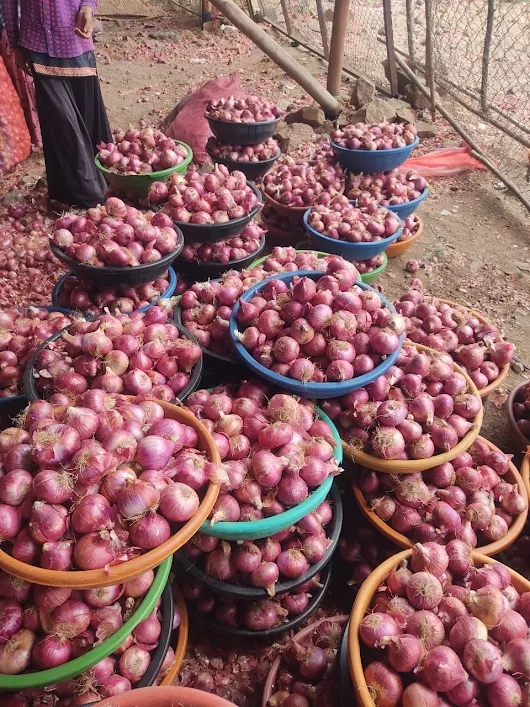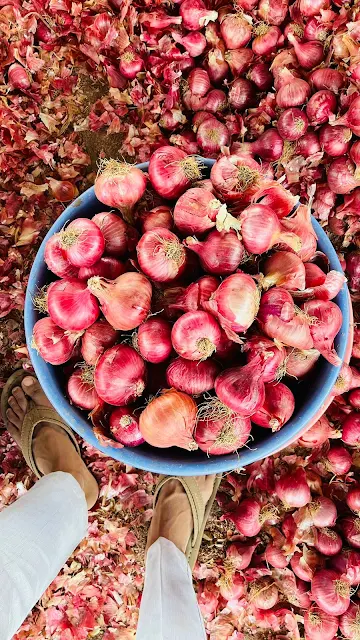 |
| Importing Onions from India |
Introduction:
India is one of the largest producers and exporters of onions in the world. With its rich agricultural resources, the country offers a wide variety of onions that are renowned for their flavor, quality, and affordability. If you are considering buying or importing onions from India, it is essential to understand the market dynamics and factors that can influence your decision. In this article, we will provide you with ten important tips and tricks to consider before making your purchase.
1. Quality Assessment:
Ensure that the onions you plan to buy meet the desired quality standards. Look for onions that are firm, heavy, and free from blemishes or signs of decay. Quality certifications or grading systems can be useful in determining the overall quality of the onions.
2. Varietal Selection:
India cultivates various onion varieties, each with its own distinct characteristics and flavor profiles. Research and select the variety that suits your requirements, whether it's for raw consumption, cooking, or processing purposes.
3. Market Research:
Conduct thorough market research to identify reliable suppliers or exporters in India. Look for companies with a proven track record, positive customer reviews, and certifications that demonstrate their adherence to international quality standards.
4. Pricing and Negotiation:
Compare prices from different suppliers to ensure you are getting a competitive deal. Negotiate the price and terms of purchase to secure the best possible agreement. Consider factors like quantity, packaging, transportation, and payment terms during the negotiation process.
5. Packaging and Transportation:
Ensure that the onions are properly packaged to maintain their freshness during transit. Proper packaging safeguards the onions from moisture, damage, and excessive bruising. Additionally, consider transportation options that ensure timely delivery and minimize the risk of spoilage.
6. Customs and Import Regulations:
Familiarize yourself with the customs and import regulations of your country regarding onion imports from India. Ensure compliance with phytosanitary requirements, documentation, labeling, and any specific restrictions or permits that may apply.
7. Quantity and Storage:
Determine the quantity of onions you need and assess your storage capabilities. Onions have different shelf lives depending on their variety and storage conditions. Plan your purchase accordingly to avoid excessive inventory or spoilage.
8. Seasonal Considerations:
Consider the seasonal availability of onions in India. Prices and quality may vary depending on the time of year. Timing your purchase during peak harvest seasons may offer advantages in terms of availability and pricing.
9. Payment Terms and Security:
Establish secure payment methods and terms with the supplier or exporter. Consider options such as letters of credit or escrow services to ensure a smooth financial transaction while safeguarding both parties' interests.
10. Communication and Support:
Maintain open lines of communication with your supplier or exporter throughout the buying process. Clear and consistent communication helps address any concerns, ensures smooth logistics, and builds a long-term business relationship.
Conclusion:
Buying or importing onions from India can be a rewarding venture, given the country's reputation as a major onion producer. By considering the ten tips and tricks outlined in this article, you can make informed decisions, secure quality produce, and navigate the import process successfully. Conduct thorough research, engage with reputable suppliers, and ensure compliance with regulations to ensure a smooth and satisfactory experience when purchasing onions from India.
Expert Advice for Onion Business Startups:
Starting a new onion business can be challenging, but with the right strategies and knowledge, you can set yourself up for success. Here are some expert tips to keep in mind as you embark on your onion business journey:
1. Develop a solid business plan: Outline your goals, target market, pricing strategy, marketing plan, and financial projections. A well-thought-out business plan will serve as a roadmap for your success.
2. Stay updated with industry trends: Continuously educate yourself about the onion industry, market dynamics, and emerging trends. This knowledge will help you make informed decisions and adapt to changing market conditions.
3. Build a strong network: Connect with other professionals, industry experts, and potential customers in the onion business. Attend trade shows, conferences, and networking events to expand your network and gain valuable insights.
4. Embrace technology: Leverage technology to streamline your operations, manage inventory, and enhance marketing efforts. Explore online platforms, social media, and e-commerce to reach a wider customer base and increase sales.
5. Prioritize customer satisfaction: Always prioritize customer satisfaction by providing exceptional service and addressing customer needs promptly. Positive word-of-mouth recommendations and customer loyalty will drive your business growth.
6. Adapt and innovate: Be open to adapting your business model and embracing innovation. Look for opportunities to differentiate yourself from competitors and explore new market segments or product offerings.
7. Monitor financials closely: Keep a close eye on your financials, including revenue, expenses, and profit margins. Regularly analyze your financial performance and make necessary adjustments to ensure profitability.
8. Seek professional advice when needed: Don't hesitate to seek advice from industry experts, consultants, or mentors who can provide guidance based on their experience. Their insights can help you navigate challenges and make informed decisions.
Remember, building a successful onion business takes time, dedication, and continuous learning. Stay passionate, persistent, and committed to providing quality products and excellent customer service. With the right strategies and a strong entrepreneurial spirit, your onion business can thrive in the market.
 |
| Onion Import Quality |
Comments
Post a Comment
We would Love to Hear From You!